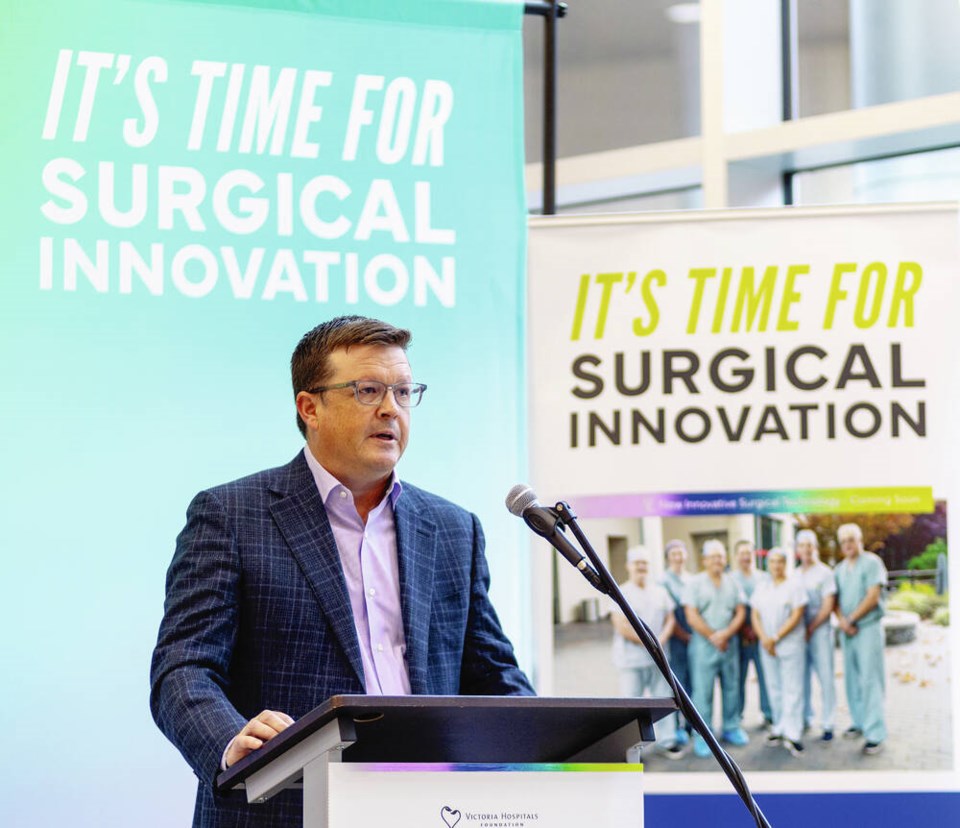Chief urologist Dr. Jeff McCracken is giddy as he describes the robot — coming to Victoria hospitals at the end of this year — whose chopstick-length arms, finger-tip size hands and fully rotational wrists can perform safer and less invasive procedures.
“Some patients travel all over North America to get this technology. We’re going to have it here ready to go, hopefully, within months,” said McCracken, chief of urology for Royal Jubilee and Victoria General hospitals.
“It’s going to mean patients can get back to work, back to exercise and back to life in a fraction of the time,” said McCracken.
It’s time, he said, for the Da Vinci robotics surgical system he first trained on in Seattle in 2008 — a standard for care in the United States and used worldwide — to arrive on Vancouver Island.
McCracken was speaking at Royal Jubilee Hospital on Wednesday for the launch of called “It’s Time for Surgical Innovation” campaign.
The foundation is fundraising for a 10-year robotics program and system upgrades that will first be used in urology and expand to ear-nose-and-throat procedures, gynecologic, thoracic and more general surgery.
The robot will enable surgeons to perform more precise and less intrusive procedures, resulting in less bleeding, a 90 per cent reduced need for blood transfusions, fewer risks overall, reduced need for pain medication, as well as shorter hospital stays and recovery time at home — which all translates into cost savings for the health authority.
When Steve Marta, a teacher at Cloverdale Traditional Elementary who now lives in Sidney, was diagnosed with prostate cancer in January, he and his wife did their research only to find that while robotic surgery was the gold standard, it was offered only in Vancouver, which would require finding a new urologist, wait times and “insurmountable” challenges.
Marta, who calls McCracken a “rock star,” instead had an open radical prostatectomy with the current technology. He was in hospital for three days, was discharged, developed a blood clot six days later — “that was scary” — returned to the ER, had a catheter in place for five days, and set off for a “very painful, very long” nine-week recovery.
For a man who regularly works out in a gym, the recovery time was tough and the experience was a hard reminder that he was not, as he thought, invincible.
“Fast forward to today and I’m doing really great, fantastic, and I’m back teaching in school.” He’s also doing everything he can to help the foundation and physicians fundraise for the new robotic system.
When directed by a physician at the bedside using a console, the robot’s tiny hands can fit in the smallest of places and magnify areas of interest in three dimensions and perfectly thread a curved suture needle.
“The robot allows us to get every angle that we need to suture properly and that again leads to less bleeding, less complications, quicker recoveries,” he said.
About 30 per cent of the robot’s time will be used in open radical prostatectomies for prostate cancer, reducing recovery time to an estimated three weeks from a typical nine weeks, for example.
McCracken said the plan is to get the current generation 10-year-old robot by the end of this year for immediate use so that when the new fifth-generation robot — which has just been released in the United States — is approved by Health Canada, it can immediately replace the current model.
“So we’re going to stay on the leading edge of technology and we may actually be accomplishing some firsts here in Victoria for the country,” said McCracken.
The robot is used in some university teaching hospitals and in larger urban hospitals such as Vancouver General Hospital, which has had a robot for 12 years, but in most hospitals it’s used in only limited specialities.
With a funded program 10-year program in place across several surgery areas, “I think it could easily be that we will be the first people to have the next generation of the robot … completely integrated with multiple services,” said McCracken.
Another major benefit of the new system is that it’s the current technology new surgeons are training on.
Without the robotic system, when those new doctors come to Victoria they would essentially have to be re-trained on “antiquated” equipment, said McCracken, who was born and raised in Victoria.
The robotic system will allow the Victoria hospitals to recruit the newest and the best, he explained.
Online training by surgeons for the robotics system is now underway.
The Victoria Hospitals Foundation said the Jawl Foundation made a “transformational” gift of $2.5 million to kick off the campaign to acquire Vancouver Island’s first surgical robot.
The Jawl Foundation’s trust and confidence was what allowed the foundation to undertake a “revolutionary project of this scale,” said foundation chief executive officer Avery Brohman, adding the hospitals’ surgeons are honoured by the pledge.
Brohman said the campaign has an undeniable energy not only because of the generous start but because of its focus on achieving better or best for patients.
Brohman said this campaign providing robotics is a first step “in pursuit of the gold standard of care on Vancouver Island” and “best-in-class technology and equipment.”
Contributions to It’s Time for Surgical Innovation campaign can be made at or by calling 250-519-1750.
People can also donate by visiting the foundation office on the Royal Jubilee campus or by mailing a cheque to Wilson Block, 1952 Bay Street, Victoria 小蓝视频, V8R 1J8.
All denominations make a difference to the total needed to provide “life-changing” equipment for the the community, according to the foundation.




